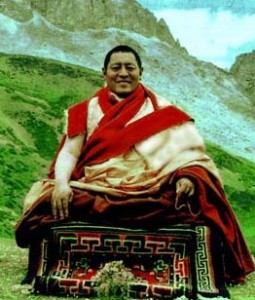The following is an excerpt from a public talk given by His Holiness Khenpo Jigme Phuntsok:
The second cause for suffering is karma—– karma meaning cause and result. This begins with these negative causes: beginning first with killing, the weightiest cause, which is to kill or to take a life. Now according to Buddhism this means the life of any and all living beings. In other religions it is more or less agreed upon that one should not kill human beings, but it is O.K. to kill other beings, that it simply doesn’t matter. But this is not O.K. This is incorrect understanding, and the reason for this is that all living beings have fear and all living beings suffer in the same way that human beings do. So even the lowliest little ant has feelings and doesn’t want to lose its life It feels suffering when it is being trod upon and so forth and smashed in this way. We have to think about how we don’t want to suffer, and we have to understand that every creature that lives feels the same way. Therefore this is the reason why we should never intentionally take the life of any living being.
The second cause to abandon is stealing. This means to take the possession of another without permission, whatever it may be. Whether it is of great value or of little value, it simply doesn’t matter. If it is something that belongs to someone else and they have every intention of maintaining that as their possession, then it should never be taken from them for any reason.
The third cause to abandon is to lie. Specifically it means here to really trick the minds of others with the specific intention to harm them by speaking that which is untrue. By doing so it immediately lowers one’s own honor and brings suffering to others. So this is something which is negative and must be abandoned.
The fourth cause to abandon is adultery or unclean sexual conduct. This specifically refers to entering into a relationship with a male or female who already belongs to somebody else. When we say “belongs to somebody else,” it means that that person is already committed to somebody else, and there is an understanding between them. To break that understanding by intervening and having a relationship is considered to be ultimate stealing of a spouse of another. Not only that. Those males and females who are already committed to one another usually have the most attachment for one another. So if someone else is with their partner, then there is nothing more painful than that because of the intensity of the attachment. It produces even more suffering than stealing other objects. Therefore it is considered to be extremely negative because it brings about such tremendous harm and harmful repercussion which arise from it. This must be abandoned from the root.
In addition to that, another action or activity which is considered to be ultimately destructive and which must be abandoned is the drinking of alcoholic beverages so as to become intoxicated. The reason for this is because it is physically harmful to the body. Also if one becomes intoxicated one loses one’s own sense of control. In that state of being out of control, all the other nonvirtues are easily accumulated. Therefore becoming intoxicated by drinking alcoholic beverages must be abandoned.
These four root causes that correspond to physical conduct must be abandoned, and then the fifth, drinking alcohol, as well. Any practitioner of Buddhism, whoever the person may be, must abandon these five. These are five root precepts which are maintained, which means the abandonment of these negative causes. Not only to abandon these five, but to guard oneself by taking the vow of what is called genyen, which is the vow of a lay practitioner who upholds these five precepts of formally vowing to abandon these five negative causes. This is something that each and every one of you should consider taking on: to become a genyen or lay practitioner who upholds these five vows, because if you have these five vows you automatically accumulate virtue in whatever you do. This also makes you somewhat similar to those who are holding the vows of higher ordination, such as the male and female novice practitioners and the male and female fully ordained, because they all have these five precepts as well.
There are two things which set the ordained apart from the lay upholders of these five vows. First of all the fact that you are wearing the robes of the Buddha, the robes of ordination. If you don’t wear your robes of ordination, you appear as a lay person So the fact that you wear your robes sets you apart as an ordained. The second point that sets you apart from a lay upholder of the vows is that in the case of a layman or laywoman, the vow is to abstain from adultery or unclean sexual conduct, but in the case of the ordained who are wearing the robes of the Buddha, you must abstain from any sexual conduct, particularly that of sexual intercourse. So this is something that you all have abandoned before you have taken these vows of ordination.
I have spent some time here just now going over these four root precepts and the fifth, which is to abandon drinking alcohol, so that everyone here, especially those who are members of the Dharma center, would clearly understand what qualifies as a precept holder of the Buddhist tradition, and particularly those who are ordained. If you are able to maintain these five precepts, that will be enough Please understand that it includes the two particulars that you are already upholding. Even if you can’t maintain the other vows, you must always maintain these five, and everyone else as lay practitioners should maintain the five as well.












OM MANI PEDME HUNG!!!